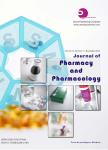Magnetic Resonance Imaging in the Acquired Demyelinating Disorders: A Pediatric Cohort Study
Magnetic Resonance Imaging in the Acquired Demyelinating Disorders: A Pediatric Cohort Study作者机构:Fernandes Figueira National Institute of Women Child and Adolescent Health-IFF/FIOCRUZ Rio de Janeiro 22250-020 Brazil D'Or Research and Teach Institute-IDOR Rio de Janeiro 22081-100 Brazil Federal University of Rio de Janeiro-UFRJ Rio dejaneiro 21941-901 Brazil
出 版 物:《Journal of Pharmacy and Pharmacology》 (药剂与药理学(英文版))
年 卷 期:2018年第6卷第1期
页 面:20-31页
学科分类:10[医学]
主 题:Magnetic resonance imaging multiple sclerosis neuromyelitis optica acute disseminated encephalomyelitis clinically isolated syndrome.
摘 要:Objective: Describing the characteristics of the MRI (magnetic resonance imaging) of patients with ADD (acquired demyelinating disorder) followed in a specialized pediatric clinic. Methods: Descriptive and retrospective study of the MRIs of a pediatric ADD cohort. The included images were acquired in machines with 1.5 or 3T magnets. Low-quality images were excluded. The radiological characteristics of the lesions were described using the 2010 Revised McDonald Diagnostic Criteria regarding localization, contrast enhancement and optic nerve alterations. Results: Twenty-three patients were included (55% female). The mean age of the first clinical event was 7.7 years. Most common diagnosis was Clinically Isolated Syndrome (35%), followed by Multiple Sclerosis (30%), Neuromyelitis Optica (17%) and Acute Disseminated Encephalomyelitis (17%). Mean time elapsed until diagnosis was 1.8 years. Follow-up MRIs of ADEM patients showed complete or partial resolution of lesions; MS lesions were mostly localized in the brain and four patients had contrast enhancement of lesions in their last available MRI. All NMO (neuromyelitis optica) patients had extensive spinal lesions, and two had optic neuritis. All patients with CIS (clinically isolated syndrome) had focal spinal lesions and evolved with radiologic improvement. Conclusions: ADEM and CIS patients' MRIs showed lesion reduction, while MS and NMO patients developed new lesions during follow-up.



